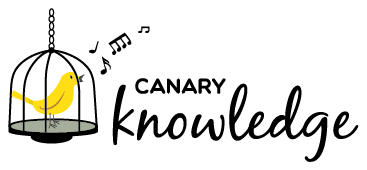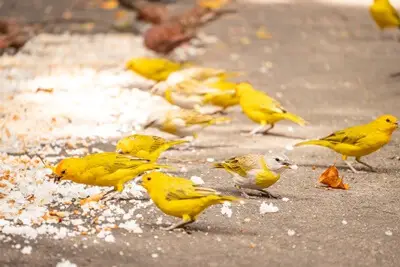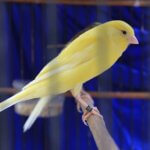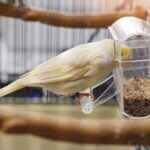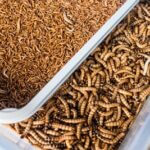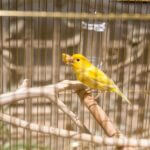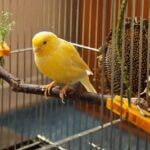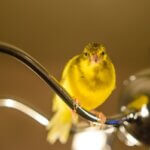Canaries are curious animals that enjoy foraging and trying new foods. Unfortunately, some foods are dangerous to canaries, including mushrooms, honey, and mangoes.
Canaries are also lactose intolerant, so they shouldn’t drink milk or eat dairy. Deep-fried, buttery, and salty foods will upset their digestive systems, raise their blood pressure, and damage their heart health.
What Foods Are Dangerous To Canaries?
Some foods won’t kill a canary outright, but they’re still dangerous to its health. They include:
Mushrooms
Both raw and cooked mushrooms cause upset stomachs in birds. Some mushroom varieties are more dangerous than others and may result in liver failure.
Anecdotal evidence from owners is that a few types of store-bought mushrooms are safe, like button mushrooms. However, research is still being conducted on whether these types are dangerous.
The long-term or subtle effects of mushrooms may reduce a canary’s quality of life or lifespan.
Bread
While bread is a popular snack to feed birds at local parks, it’s unsafe for canaries (and most birds) to eat, especially in large amounts. Bread is filling, but it lacks nutrients.
Offering bread to a bird means it won’t eat more nutritious food, like fruits and vegetables.
Store-bought bread is also high in sugar and salt, which can upset canaries’ digestion and lead to impaction.
Pastries
Pastries are bad for canaries because they lack nutrients. Even worse, pastries are high in oil and sugar, which can upset a canary’s metabolism, digestion, and ability to process nutrients.
Raw Tomatoes
Tomatoes are dangerous because they contain more than ten types of acid.
According to MethodsX, the main organic acids in tomatoes are citric acid, malic acid, ascorbic acid, and citric acid. These upset a canary’s digestion and metabolism, leading to muscle cramps and appetite loss.
Avoid any raw tomato, including cherry tomatoes. Tomatoes lose their acidity as they ripen but are often too acidic for your canary.
Cooking removes the acidity in tomatoes. So, if you must feed canaries tomatoes, turn them into sauce or dry them. Don’t feed them store-bought tomato sauce and dried tomatoes to your canary, as these contain harmful ingredients like oil and salt.
Furthermore, tomatoes contain a toxin called solanine. However, solanine is mostly concentrated in the roots, stems, and leaves.
Honey
Unpasteurized honey is dangerous to birds since it may contain bacteria or grow mold. Unpasteurized honey is often called raw or wild honey.
All honey starts unpasteurized but undergoes a process where it’s heated to high temperatures. This removes bacteria and toxins but also destroys most vitamins and antioxidants.
That makes wild or raw honey ideal for humans with strong immune systems but dangerous for canaries, which can die following minimal consumption.
Mango
While there are no official studies, anecdotal evidence reports that canaries react badly to eating mangoes because they’re high in sugar, which can upset a canary’s digestion, causing diarrhea.
Owners have stated that their canaries experienced allergic reactions to mangoes and tropical fruits.
Milk And Dairy
Birds are lactose intolerant, so they shouldn’t be given foods that contain lactose, including cow’s milk and dairy products. Lactose causes diarrhea in birds, leading to an upset stomach and runny droppings.
Lactose-free alternatives are safe but aren’t nutritious, so they’re empty calories for canaries. The best choice is almond milk, but only as an occasional treat.
Buttery Food
Butter is comprised almost entirely of fat, with only a small amount of protein. It may also contain salt, which is bad for the canary’s blood pressure and heart health.
Deep Fried Food
Oil is made completely of fats, making it dangerous for a canary’s heart, weight, and skin. A canary shouldn’t get close to oily substances because it can get on their feathers and lead to irritation.
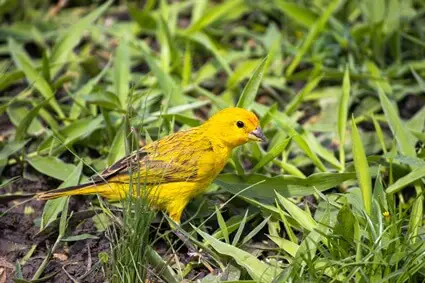
Salty Foods
Many salty foods are unhealthy for canaries, including:
- Chips
- Junk food
- Saltine crackers
- Pretzels
- Popcorn
The salt can harm a pet canary even if the base ingredient is healthy. When a canary ingests too much salt, it causes:
- Excessive thirst
- Dehydration
- Kidney failure
What Foods Are Toxic To Canaries?
Some foods are deadly to canaries in the short and long term. You should never offer canaries:
Avocado
Avocados contain a toxin called persin. All parts of the avocado, including the tree’s bark, contain this compound. This makes it toxic to many animals, but especially to birds.
Canaries, parakeets, and cockatiels are especially sensitive to persin.
According to the Journal of the American Veterinary Association, canaries react less harshly than budgerigars, but they can still have debilitating or lethal effects. When ingested, persin may cause:
- Weakness
- Respiratory issues
- Cardiovascular issues
- Sudden death
Tomato Leaves And Stems
As mentioned, tomatoes produce a toxin called solanine, which protects the plant from bugs or animals that would eat it. This toxin can be found in all parts of the tomato plant, especially the greens.
According to Veterinary and Human Toxicology, solanine is toxic to humans and animals. The fruit contains a lesser amount, especially if ripe and cooked.
Humans are better at dealing with the toxin and processing it safely than animals, especially small animals. The effects of solanine may include:
- Nausea
- Diarrhea
- Dizziness
- Stomach cramps
Raw Potatoes
Raw potatoes are unsafe for canaries since they contain protease, an enzyme inhibitor.
Enzyme inhibitors prevent the body from breaking down other enzymes, which means your canary will absorb fewer nutrients from its food.
Raw potatoes also contain high amounts of starch. Starch is dangerous for canaries as it can settle in the crop or small intestine, eventually leading to infections.
Cooking reduces the amount of protease and starch in the plant. You can safely offer cooked potatoes to canaries, as long as you don’t add salt or oil.
Raw potatoes contain solanine, much like the leaves and stems of the tomato plant. The potatoes’ green parts have higher solanine levels, so remove these before feeding them to canaries.
Eggplant
Eggplants belong to the nightshade family, alongside potatoes and tomatoes. This means that eggplant also contains significant levels of solanine, which is toxic to canaries.
Fruit Pits And Seeds
Some fruit pits and seeds include cyanide, which is toxic to birds.
Humans can safely ingest these fruit seeds, as there’s rarely enough cyanide to affect us. However, birds are smaller, so it takes far less cyanide to harm them.
Of course, not all pits and seeds contain cyanide. Those that are especially dangerous include:
- Apples
- Cherry
- Apricot
- Cherry
- Plums
Cassava
Cassava has levels of cyanide that are believed to be dangerous to birds. Note that cassava is made into many different types of food, so your canary may eat it by accident if you don’t check the ingredients list.
You’ll often see cassava turned into flour and tapioca, but the root is eaten in its original form.
Coffee
Coffee contains caffeine, making it toxic to birds. It can lead to effects like:
- Increased heart rate
- Arrhythmia
- Hyperactivity
- Cardiac arrest
Bubblegum
Most owners don’t intentionally feed their canaries bubblegum. However, it’s possible for your canary to accidentally consume it if you:
- Blow bubbles near it.
- Leave chewed gum in a wrapper (even temporarily) where the bird can reach it.
- Leave a pack of wrapped gum on a table or shelf while your canary is free-roaming in an otherwise bird-safe room.
Bubblegum is dangerous because it can stick to the canary’s feathers, inhibiting its ability to fly or preen.
Canaries eating gum may choke right away. If the gum is sugar-free gum, it contains xylitol, a toxic substance to birds.
Chocolate
Chocolate is toxic to canaries due to caffeine and theobromine. As mentioned, caffeine is dangerous for canaries. Theobromine may cause symptoms like:
- Vomiting
- Diarrhea
- Increased heart rate
- Hyperactivity
- Seizures
Sugar-Free Candy
Sugar-free candy is toxic to canaries because of xylitol. Xylitol has been proven to create the following reactions in canaries:
- Hypoglycemia
- Liver failure
- Seizures
In the Journal of Avian Medicine and Surgery, researchers noted that the death of 27 cape sugarbirds was likely due to xylitol toxicity.
Onion And Garlic
Onion and garlic are toxic to canaries as they contain sulfur and alkaloids, which lead to:
- Weakness
- Anemia
- Tachycardia
When a canary ingests enough of the substance, it can even lead to death. Beware other plants in the onion family, including:
- Shallots
- Chives
- Leeks
Raw Beans
Raw, dry beans should never be fed to your canary because uncooked beans contain a substance called hemagglutinin, which is toxic to birds.
Levels of hemagglutinin differ depending on the bean, but it’s highest in red kidney beans. Hemagglutinin poisoning in birds will cause:
- Nausea
- Vomiting
- Diarrhea
Cooking beans drastically lowers the levels of hemagglutinin present. So, you can offer cooked beans, but only as a treat or supplement.
Alcohol
When ingested, alcohol is first absorbed into the bloodstream, reaching the brain and other parts of the body. Small amounts can lead to disorientation, digestive issues, vomiting, and loss of balance.
Canaries are smaller than humans and possess a faster metabolism. When given alcohol, a canary’s body begins to shut down. It may recover if the amount is extremely low, but it may never bounce back.
No amount of alcohol is good for a canary, and it’s impossible to know how much is too much. If your canary doesn’t receive immediate help, it’s likely to die.
Never, under any circumstances, give alcohol to your canary. Accidents can happen, so check the area for available drinks when allowing your canary to free-roam in your home.
